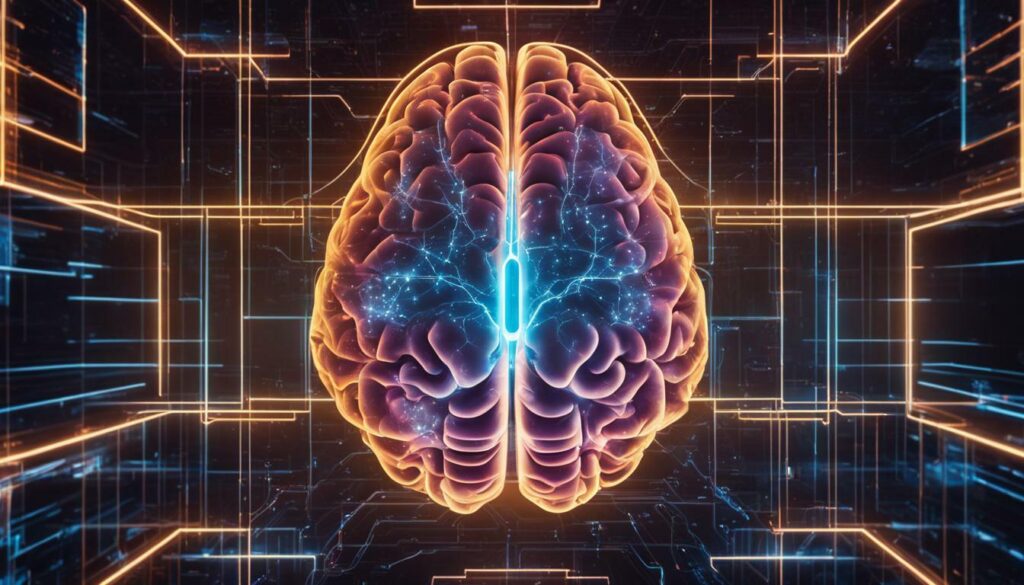
AI is revolutionizing medical education and bringing numerous benefits to the healthcare industry. The integration of AI technology in medical education is transforming the way students learn, researchers conduct studies, and healthcare professionals make diagnoses and provide patient care. By leveraging the power of AI, medical education is becoming more personalized, efficient, and effective in preparing future healthcare providers for the challenges of the industry.
- AI in medical education enhances learning techniques, research advancements, and patient care.
- Personalized learning experiences improve engagement and learning outcomes for medical students.
- AI facilitates advancements in research by analyzing vast amounts of medical data and accelerating research processes.
- Streamlining patient care through AI optimizes workflows and improves diagnostic accuracy.
- Ethical considerations and responsible implementation of AI in medical education are crucial for unbiased and effective use.
With AI’s potential to transform medical education, it is essential to navigate the ethical considerations and responsible implementation of this technology. By addressing bias, monitoring system performance, and conducting rigorous research, we can ensure that AI tools are reliable, trustworthy, and aligned with the principles of healthcare ethics. Clear roles and responsibilities for developers, administrators, and educators are pivotal in creating a healthcare workforce that can effectively utilize AI to meet the needs of patients and populations. The framework presented by the American Medical Association (AMA) provides guidance and support in the development and use of AI in medical education.
Personalized Learning Experiences
AI is revolutionizing medical education by tailoring learning experiences to meet the unique needs of each student. By leveraging AI algorithms, we can analyze individual learning patterns and provide customized educational content that improves learning outcomes and engagement.
One of the key benefits of AI-powered medical education is the ability to adapt educational materials to a student’s level of understanding and learning pace. With AI, medical students can receive personalized recommendations for further study, ensuring they grasp complex concepts and bridge any knowledge gaps. This targeted approach not only enhances comprehension but also boosts confidence and motivation.
Moreover, AI can facilitate interactive learning experiences through the use of virtual simulations and interactive case studies. These tools provide students with the opportunity to apply theoretical knowledge in practical scenarios, building critical thinking and problem-solving skills. By actively engaging with AI-powered educational resources, students are better prepared for the challenges they will face in real-world medical practice.

Enhancing medical education with AI also includes reducing administrative burdens for educators. AI-powered systems can automate tasks such as grading assessments and providing immediate feedback on assignments. This frees up valuable time for educators to focus on mentoring and guiding students, fostering a more supportive and collaborative learning environment.
Key Benefits of AI in Medical Education
- Personalized learning experiences tailored to individual students
- Improved comprehension and knowledge retention
- Enhanced critical thinking and problem-solving skills
- Reduced administrative burdens for educators
- Promotion of a supportive and collaborative learning environment
In conclusion, AI-powered medical education has the potential to transform the way students learn and prepare for their future careers. By harnessing the power of AI algorithms, we can create personalized learning experiences that improve comprehension, critical thinking, and problem-solving skills. Additionally, AI streamlines administrative tasks for educators, allowing them to focus on providing mentorship and guidance to students. As we embrace the benefits of AI in medical education, we must also address ethical and legal considerations to ensure responsible and effective implementation.
Advancements in Research
AI is playing a pivotal role in advancing medical research by enabling efficient data analysis and facilitating discoveries. With the increasing amount of medical data available, AI tools and machine learning algorithms have the capacity to process and analyze vast datasets, leading to improved research outcomes and accelerated discovery of new treatment approaches.
One area where AI is making significant contributions is in the field of genomics. By leveraging AI algorithms, researchers can analyze genomic data more effectively, identifying patterns and variations that may be associated with certain diseases or genetic predispositions. This knowledge can then be used to develop personalized treatment plans and interventions, tailored to an individual’s unique genetic makeup.
Furthermore, AI-powered data analysis tools are instrumental in identifying potential drug targets and optimizing drug discovery processes. By analyzing large datasets of molecular structures, AI algorithms can identify molecules with the potential to interact with specific disease targets, accelerating the development of new medications and therapies.
| Advancements in Research | Benefits |
|---|---|
| Efficient data analysis | Accelerated research processes |
| Genomic analysis | Personalized treatment plans |
| Drug discovery | Optimized development of medications and therapies |
Despite the significant advancements made possible by AI in medical research, it is important to note that ethical considerations and responsible implementation are crucial. The use of AI tools should be governed by guidelines and regulations to ensure fairness, privacy, and safety. Moreover, constant monitoring of AI system performance is essential to identify and rectify any biases or errors that may be present.
Research on the efficacy and impact of AI in medical education is ongoing, aiming to uncover the potential benefits and challenges associated with its implementation. By conducting rigorous studies and collecting empirical evidence, we can develop a comprehensive understanding of how AI can best serve the needs of medical education, ultimately improving patient care and healthcare outcomes.

“The integration of AI into medical research has the potential to revolutionize the way we approach healthcare. However, it is essential that we proceed with caution and ensure ethical and responsible use. By establishing clear guidelines and fostering collaboration between researchers, developers, and educators, we can harness the power of AI to drive impactful discoveries and improve patient outcomes.”
Streamlining Patient Care
AI is transforming patient care by streamlining processes and enhancing the accuracy of diagnostic procedures. By leveraging AI-powered technologies, healthcare organizations can optimize workflows, improve efficiency, and ultimately provide better care to patients. One area where AI is making a significant impact is in diagnostics, particularly in the early detection of diseases like breast cancer and skin cancer.
AI algorithms can analyze vast amounts of medical data, including patient records, imaging scans, and genetic information, to identify patterns and potential abnormalities. This enables physicians to make more accurate diagnoses and develop personalized treatment plans. For example, AI-powered imaging systems have shown promising results in improving the accuracy of breast cancer diagnosis, reducing the number of false positives and unnecessary biopsies.

In addition to diagnostics, AI can also assist in other aspects of patient care. For instance, natural language processing (NLP) algorithms can analyze medical records and extract relevant information, saving time for healthcare professionals and enabling them to focus more on patient interactions. AI-powered chatbots can also be used to provide immediate support and answers to common patient queries, enhancing patient satisfaction and reducing the burden on healthcare staff.
The integration of AI in patient care, however, comes with its own set of challenges. Ethical considerations, such as ensuring patient privacy and addressing bias in algorithms, must be carefully addressed. Ongoing monitoring of AI system performance is vital to detect and rectify any issues that may arise. Furthermore, research must be conducted to evaluate the effectiveness and safety of AI tools in various healthcare settings.
In conclusion, AI has the potential to revolutionize patient care by streamlining processes, improving diagnostic accuracy, and enhancing overall healthcare outcomes. By responsibly implementing AI technologies, healthcare organizations can leverage the power of AI to provide personalized, efficient, and high-quality care to patients.
Ethical Considerations and Responsible Implementation
As AI continues to shape medical education, it is crucial to address ethical considerations and establish responsible practices to maximize its benefits and minimize potential risks. The impact of AI on medical education is far-reaching, with the potential to revolutionize learning experiences and enhance patient care. However, it is important to navigate the ethical challenges associated with the implementation of AI in this field.
One key consideration is the need to address bias in AI algorithms and systems used in medical education. AI algorithms are only as reliable as the data they are trained on, and if the data contains biases, the AI system may perpetuate these biases, leading to unfair or inaccurate outcomes. To ensure fairness and equity, it is necessary to critically evaluate the training data and regularly monitor system performance.
Another crucial aspect is the conduct of ongoing research on the efficacy and impact of AI tools in medical education. It is important to understand the strengths and limitations of AI systems, as well as their potential impact on student learning and patient outcomes. Through rigorous research, we can continue to refine and improve AI algorithms, ensuring their effectiveness in enhancing medical education.
The responsible implementation of AI in medical education also requires clear roles and responsibilities for developers, administrators, and front-line educators. Collaborative efforts between these stakeholders are necessary to establish guidelines, protocols, and governance frameworks that promote the ethical use of AI. The American Medical Association (AMA) has presented a framework that guides the development and use of AI in medical education, providing valuable insights into best practices and ensuring the trustworthiness of AI systems.
FAQ
Q: How can AI improve medical education?
A: AI has the potential to enhance medical education by providing personalized learning experiences, improving learning outcomes, reducing administrative burdens, and promoting educational equity.
Q: Can AI assist in diagnostic processes?
A: Yes, AI can assist in diagnostics by improving the accuracy of breast cancer diagnosis and detecting skin cancer.
Q: What considerations are important when using AI in medical education?
A: It is important to consider ethical and legal aspects, address bias, monitor system performance, and conduct research on the efficacy of AI tools.
Q: How can AI be effectively implemented in medical education?
A: Clear roles and responsibilities must be defined for developers, administrators, and front-line educators to ensure the responsible and effective implementation of AI in medical education.
Q: What framework can guide the development and use of AI in medical education?
A: The framework presented by the AMA promotes trustworthiness and supports the goal of creating a healthcare workforce that can meet the needs of patients and populations.



